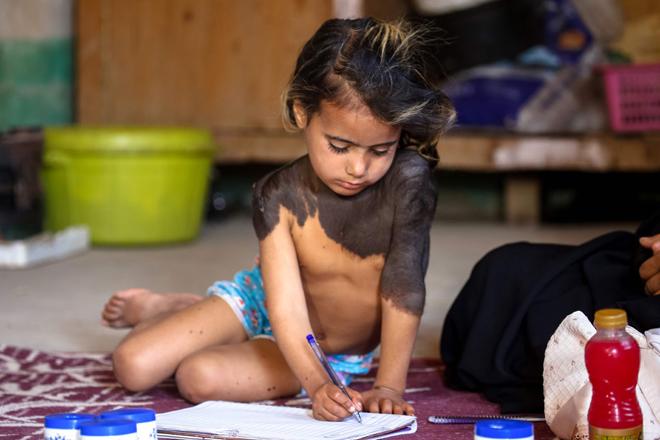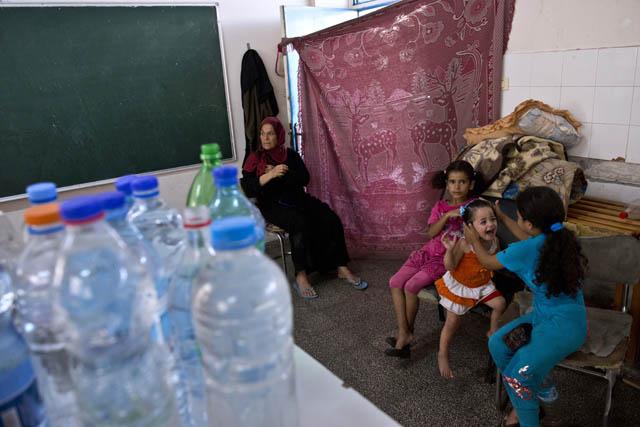You are here
In an Iraqi village, a little girl hides skin disease from neighbours
By AFP - May 30,2018 - Last updated at May 30,2018

Haura, a four-year-old Iraqi child with a rare skin congenital disease that covers much of her upper body in black marks and hair, uses a pen to scribble in a notebook in her family home in the village of Wahed Haziran, Diwaniya province, on April 17 (AFP photo)
WAHED HAZIRAN, Iraq — Four-year-old Iraqi girl Haura should be enjoying her childhood — games in the street, tearing in and out of friends' homes and small squabbles over toys.
Instead, a rare congenital skin condition covering much of her upper body in black marks and hair has made her the object of ridicule in her village, about 200 kilometres south of Baghdad.
Everyday, Haura's parents dress her in long sleeved shirts and high collars, but it's a losing battle — her neck gives her away, to laughter and jeers.
"In two years, she will have to go to school — we really dread that", says Haura's mother Alia Khafif at the family home, in Wahed Haziran, Diwaniya province.
"How will the other children behave with her? We can't guarantee that she'll be comfortable in a school and this is the biggest obstacle for her future," sighs Khafif, dressed in a traditional long black veil.
The black marks and hair cover Haura's shoulders and almost her entire back, along with much of her arms and neck.
But things could still get a lot worse.
Her condition, a giant form of naevus — birthmarks or moles — make her highly vulnerable to malignant melanoma, the most dangerous skin cancer.
To ward off a potentially "fatal" outcome, the best treatments would be a skin graft and laser sessions, dermatologist Aqil Al Khaldi tells AFP. He also recommends psychological help.
But Haura's despairing family can't afford these things.
Iraq's medical system has been destroyed by the 15 years of chaos that has followed the toppling in 2003 of dictator Saddam Hussein, and by more than a decade of sanctions before that.
'Won't play with her'
"We have seen several doctors and they all told us that she cannot be treated in Iraq. They all say we have to go to a specialist centre abroad," says Haura's mother.
"We cannot afford the journey or medical costs."
Even treatment to alleviate itching is beyond the family's reach — and the irritation gets worse with the summer heat, as temperatures regularly exceed 50oC.
"What we have is barely enough to live on and to send four brothers and sisters to school," adds Khafif, whose husband is old, sick and unemployed.
Haura's teenage brother Ahmad stands up for her.
"She's a normal child, there's nothing wrong with her," he insists.
"But when she leaves the house, our neighbours laugh at her."
Outside in the street, passing children avoid her like the plague.
"Even if the Prophet asks us, we won't play with her", one says.
So when her siblings head to school, Haura sits and plays on her own — or peers mournfully into a little green-framed mirror, held up close to show only her big brown eyes and pretty face.
Related Articles
AL KARAMAH — Syria — Inside a dank clinic in the north of war-torn Syria, a girl covered in scabs wails and tries to wriggl
Amer used to spend hours straightening her bouncy curls, she told AFP as she began her day at the Curly Studio, which became Egypt's first natural hair salon in 2018.
Feriel Al Zaaneen hasn't had a shower in more than a month. Like thousands of Palestinians, she doesn't have enough water to wash, adding to the miseries of life in war-battered Gaza.














